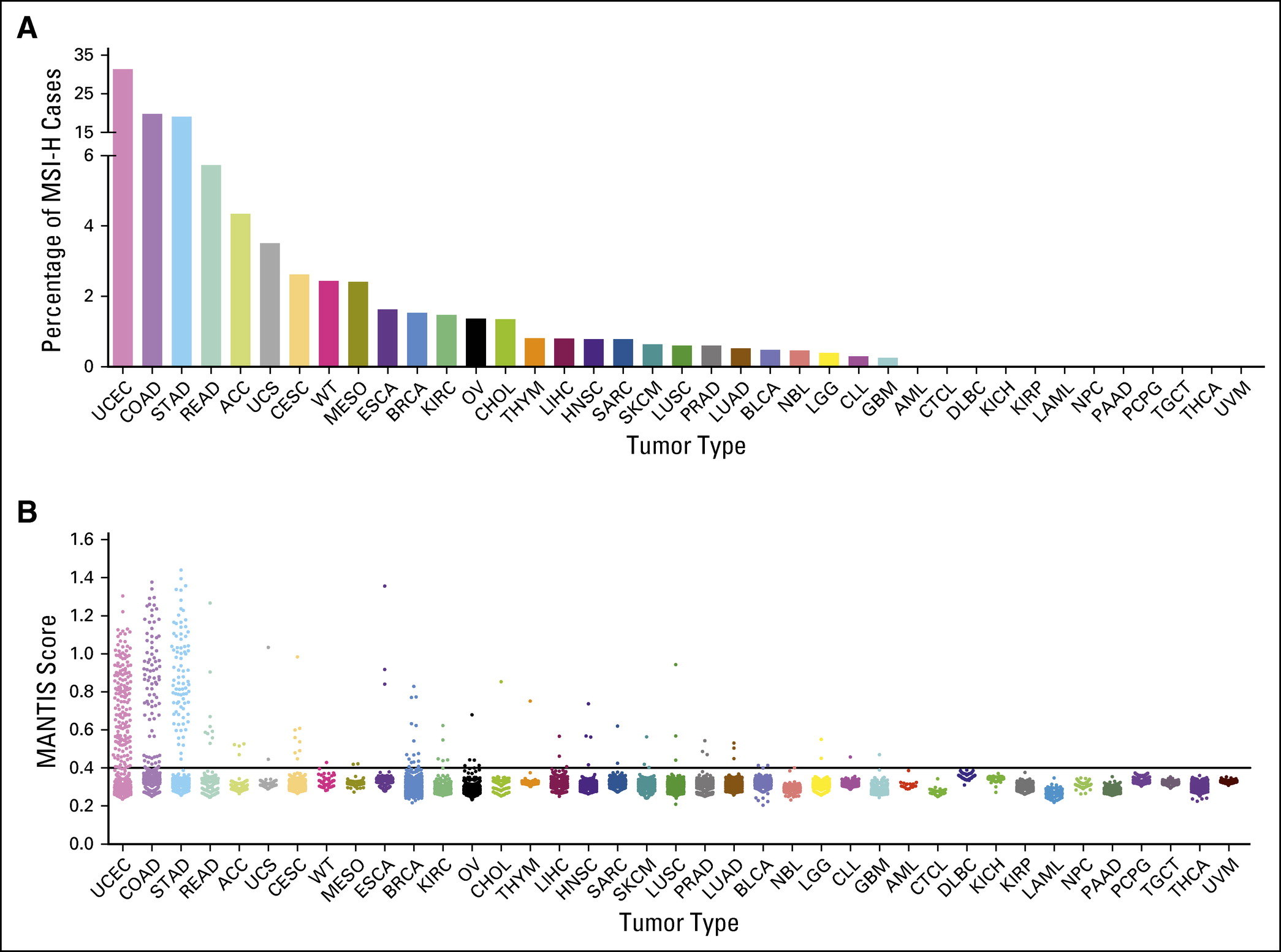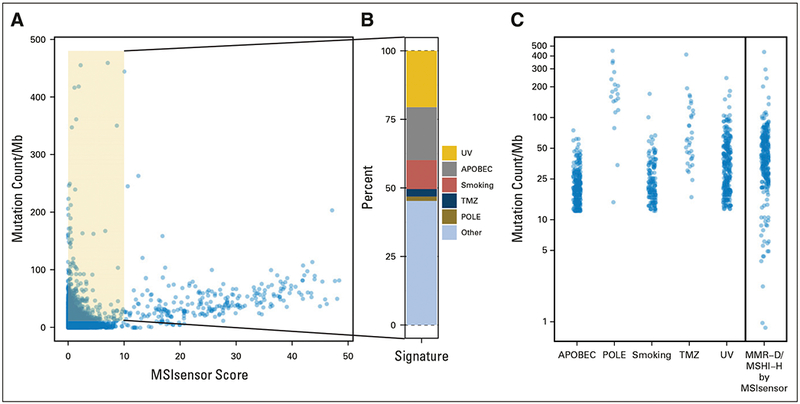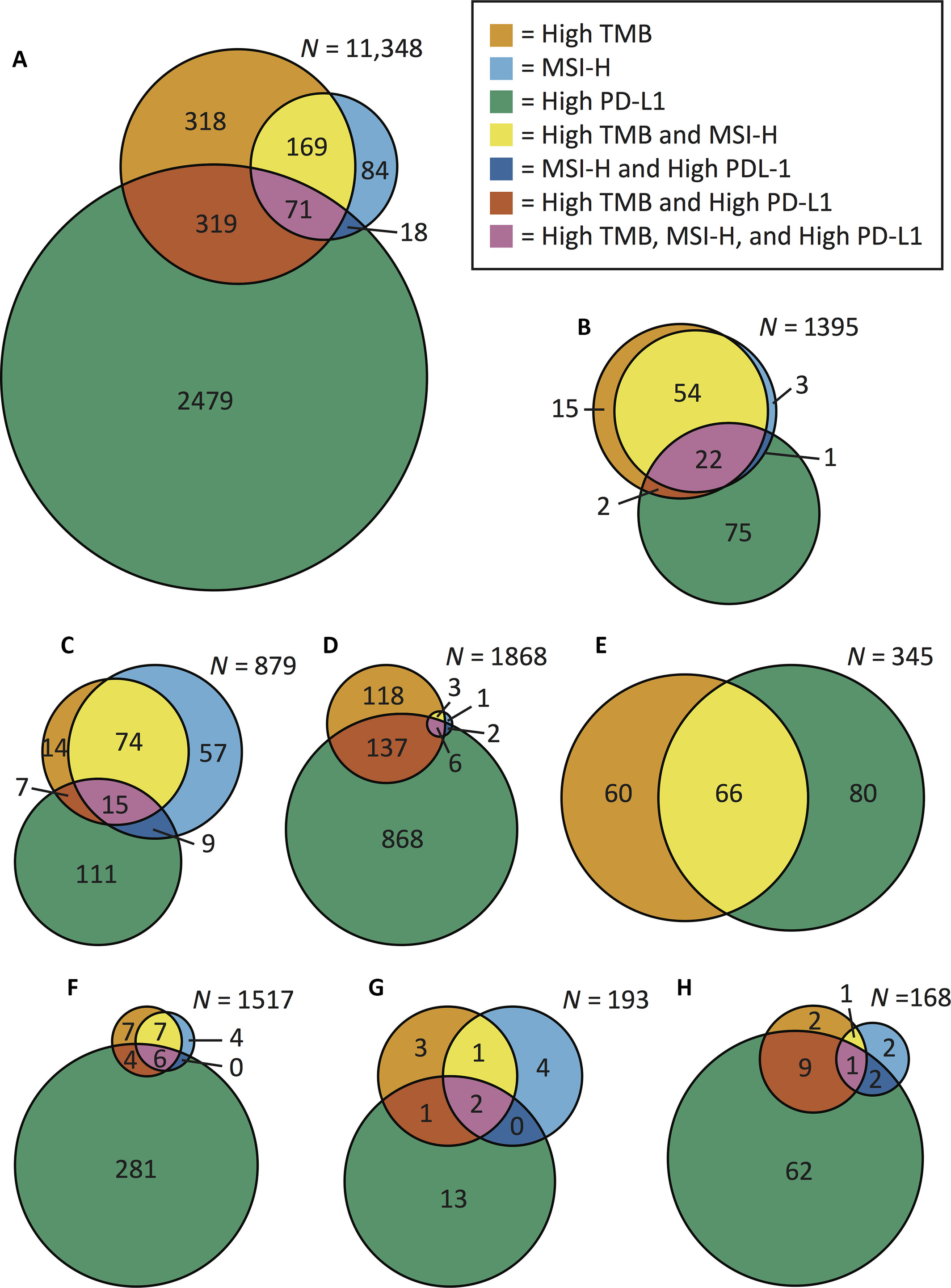MSI
- A change that occurs in the DNA of certain cells (such as tumor cells) in which the number of repeats of microsatellites (short, repeated sequences of DNA) is different than the number of repeats that was in the DNA when it was inherited. The cause of microsatellite instability may be a defect in the ability to repair mistakes made when DNA is copied in the cell. Also called MSI.[^1]
- MSI is defined as a difference in length of microsatellites (DNA nucleotide repeats) when comparing tumor DNA with normal DNA from the same individual.
- Microsatellite sequences (MS) are repeating stretches of DNA located throughout the entire genome. MS are one to six base pairs long and are repeated many thousand times. [^2]
MSI detection
MSI-PCR[^2]
- patient tumor and normal DNA for five mononucleotide microsatellite loci with PCR
MSI high (MSI-H) is present if they differ in at least two of the markers and MSI low (MSI-L) is present if they differ in one of the markers.
MS are identical in each cell of an individual, normal and malignant, condition referred to as microsatellite stability (MSS).
MMR-IHC[^3]
These sites are prone to DNA replication errors as a result of DNA polymerase slippage, which is effectively corrected through the mismatch repair (MMR) system.
detecting MMR protein expression status has been IHC for MLH1, MSH2, PMS2, and MSH6 expression.
Tumors were MMR proficient if all four proteins were expressed (retained) by IHC and MMR deficient (MMR-D) if any of the four proteins was not expressed (lost) by IHC.
NGS
- mSINGs[^4]
- MSIsensor[^5]
- MANTIS[^6]
- MSIseq[^7]
- Count altered MS loci per Mb[^8]
Landscape of MSI

Fig 1. Prevalence of microsatellite instability (MSI) across 39 human cancer types.[^9]
MSI and TMB
Both studies[^3][^9] looked at mutational burden and found that MSI tumors have a significantly
higher mutational burden compared with microsatellite stable (MSS) tumors.[^10]
The vast majority (85%) of MSI-High cases also had high TMB, but the converse was not true. TMB and MSI status in cancer genomes are correlated and that the majority of MSI-High cases also had high overall TMB.[^11]
Thirty percent of MSI-H cases were TMB-low, and only 26% of MSI-H cases were PD-L1 positive. The overlap between TMB, MSI, and PD-L1 differed among cancer types.[^8]

ref
[^1]: url: https://www.cancer.gov/publications/dictionaries/cancer-terms/def/microsatellite-instability
[^2]: Boland, C.Richard, and Ajay Goel. “Microsatellite Instability in Colorectal Cancer.” Gastroenterology, vol. 138, no. 6, 2010, pp. 2073–2087.
[^3]: Middha S, Zhang L, Nafa K, et al. Reliable pan-cancer microsatellite instability assessment by using targeted next-generation sequencing data[J]. JCO Precision Oncology, 2017, 1: 1-17.
[^4]: Salipante S J, Scroggins S M, Hampel H L, et al. Microsatellite instability detection by next generation sequencing[J]. Clinical chemistry, 2014: clinchem. 2014.223677.
[^5]: Niu B, Ye K, Zhang Q, et al. MSIsensor: microsatellite instability detection using paired tumor-normal sequence data[J]. Bioinformatics, 2013, 30(7): 1015-1016.
[^6]: Kautto E A, Bonneville R, Miya J, et al. Performance evaluation for rapid detection of pan-cancer microsatellite instability with MANTIS)[J]. Oncotarget, 2017, 8(5): 7452.
[^7]: Huang M N, McPherson J R, Cutcutache I, et al. MSIseq: software for assessing microsatellite instability from catalogs of somatic mutations[J]. Scientific reports, 2015, 5: 13321.
[^8]: Vanderwalde A, Spetzler D, Xiao N, et al. Microsatellite instability status determined by next‐generation sequencing and compared with PD‐L1 and tumor mutational burden in 11,348 patients[J]. Cancer medicine, 2018, 7(3): 746-756.
[^9]: Bonneville R, Krook M A, Kautto E A, et al. Landscape of microsatellite instability across 39 cancer types[J]. JCO precision oncology, 2017, 1: 1-15.
[^10]: Haraldsdottir S. Microsatellite Instability Testing Using Next-Generation Sequencing Data and Therapy Implications[J]. 2017.
[^11]: Frampton G M, Fabrizio D A, Chalmers Z R, et al. Assessment and comparison of tumor mutational burden and microsatellite instability status in> 40,000 cancer genomes[J]. Annals of Oncology, 2016, 27(suppl_6).